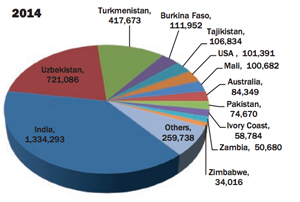Bangladesh Decreases Its Use of Uzbek Cotton
A recent study shows that the amount of Uzbek cotton Bangladesh imported in 2014 decreased by over 25% to 721,086 bales. This amount represents 21% of Bangladesh’s import of raw cotton, a far cry from the 63% market share Uzbekistan once held in the textiles and ready-made-garment powerhouse.*
This decline can be attributed to Bangladesh diversifying its cotton sourcing by deliberately increasing its imports from Indian and African countries, but it is also due to factors that have discouraged the use of Uzbek cotton.
One of the main factors referenced that have minimized Uzbekistan’s market share is because of, “some Western retailers rejecting Uzbek cotton on ethical grounds.”
The pressure put on suppliers by some of world’s largest apparel and home goods brands and retailers, which have signed Responsible Sourcing Network’s Cotton Pledge has contributed to this notable decrease in Bangladeshi imports.
RSN Director Patricia Jurewicz commented, “RSN’s intention when creating the Cotton Pledge was to build a coalition of companies and shift the market away from cotton harvested with forced labor. This study clearly shows that the market is rejecting slave-picked cotton.”
Brand and retailer signatories are commended not only for signing the Cotton Pledge, but for communicating their commitments to their suppliers and eliminating Uzbek cotton from their supply chains.
Signatories should continue with their efforts to engage and educate their suppliers on this issue. Although Uzbekistan has made efforts to minimize its use of forced child labor, it is still forcing over a million adults a year into the fields to harvest cotton. The Uzbek-German Forum for Human Rights reports a number of suicides, deaths, and harassment of human rights defenders in Cotton Chronicle during the 2015 harvest.
Prospective signatories should be encouraged by this evidence to sign the Cotton Pledge and help keep the pressure on the Uzbek Government to put an end to forced labor in Uzbekistan.
*Source: Cotton Outlook – Bangladesh, March 2015



By: Tom Sheahan, Cotton Initiative Intern @sheahantom
